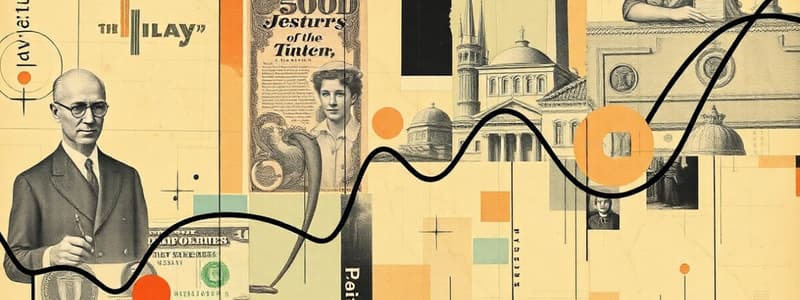Podcast
Questions and Answers
What is the primary focus of the book's explanations?
What is the primary focus of the book's explanations?
- Advanced mathematical models of economic behavior
- How to invest in stocks effectively
- Clear and simple explanations of economic concepts (correct)
- Complex economic theories only understood by experts
Which economic schools of thought are emphasized in the book?
Which economic schools of thought are emphasized in the book?
- Behavioral economics and New Classical economics
- Keynesian and Classical economics
- Austrian and Monetarist schools (correct)
- Post-Keynesian and Institutional economics
Who was a notable Austrian economist that influenced the Federal Reserve in the 1980s?
Who was a notable Austrian economist that influenced the Federal Reserve in the 1980s?
- Alan Greenspan (correct)
- James M. Buchanan
- Milton Friedman
- Friedrich A. Hayek
What historical context does the book use to explain economic concepts?
What historical context does the book use to explain economic concepts?
In which year did Friedrich A. Hayek receive a Nobel Prize?
In which year did Friedrich A. Hayek receive a Nobel Prize?
What is the basis of the Monetarist school of thought?
What is the basis of the Monetarist school of thought?
James M. Buchanan received the Nobel Prize in which year?
James M. Buchanan received the Nobel Prize in which year?
What does the book aim to address regarding economics?
What does the book aim to address regarding economics?
How has the influence of the Austrian school changed over time?
How has the influence of the Austrian school changed over time?
Why is the book structured as a series of letters?
Why is the book structured as a series of letters?
Flashcards
Inflation
Inflation
A situation where the general price level of goods and services in an economy rises over a period of time.
Recession
Recession
A significant decline in general economic activity, characterized by a decrease in production, employment, and consumer spending.
Depression
Depression
A severe and prolonged recession, marked by high unemployment, a sharp drop in output, and a decline in asset values.
Business cycle
Business cycle
Signup and view all the flashcards
Money supply
Money supply
Signup and view all the flashcards
Foreign currencies
Foreign currencies
Signup and view all the flashcards
Government's economic behavior
Government's economic behavior
Signup and view all the flashcards
Monetarism
Monetarism
Signup and view all the flashcards
Austrian Economics
Austrian Economics
Signup and view all the flashcards
Federal Reserve System
Federal Reserve System
Signup and view all the flashcards
Study Notes
Book Purpose and Structure
- Intended for readers unfamiliar with economics, business, or money.
- Presented as a series of letters between an economist uncle and a ninth-grade student.
- Explains concepts through historical examples, including ancient Rome and modern events.
Topics Covered
- Money's origins and history
- History of the dollar
- Business cycle
- Inflation
- Recession
- Depression
- Foreign currencies
- Government economic behavior
Theoretical Framework
- Employs Austrian and Monetarist economic theories.
- Austrian school emphasizes Austrian origins and the quantity of money.
- Monetarist school (often called the Chicago school) focuses on the quantity of money in the economy.
- Noteworthy Austrian economists: Friedrich A. Hayek (1974 Nobel Prize), James M. Buchanan (1986 Nobel Prize), and Alan Greenspan (Federal Reserve Chairman in the 1980s).
- Noteworthy Monetarist economist: Milton Friedman (1976 Nobel Prize).
Studying That Suits You
Use AI to generate personalized quizzes and flashcards to suit your learning preferences.




